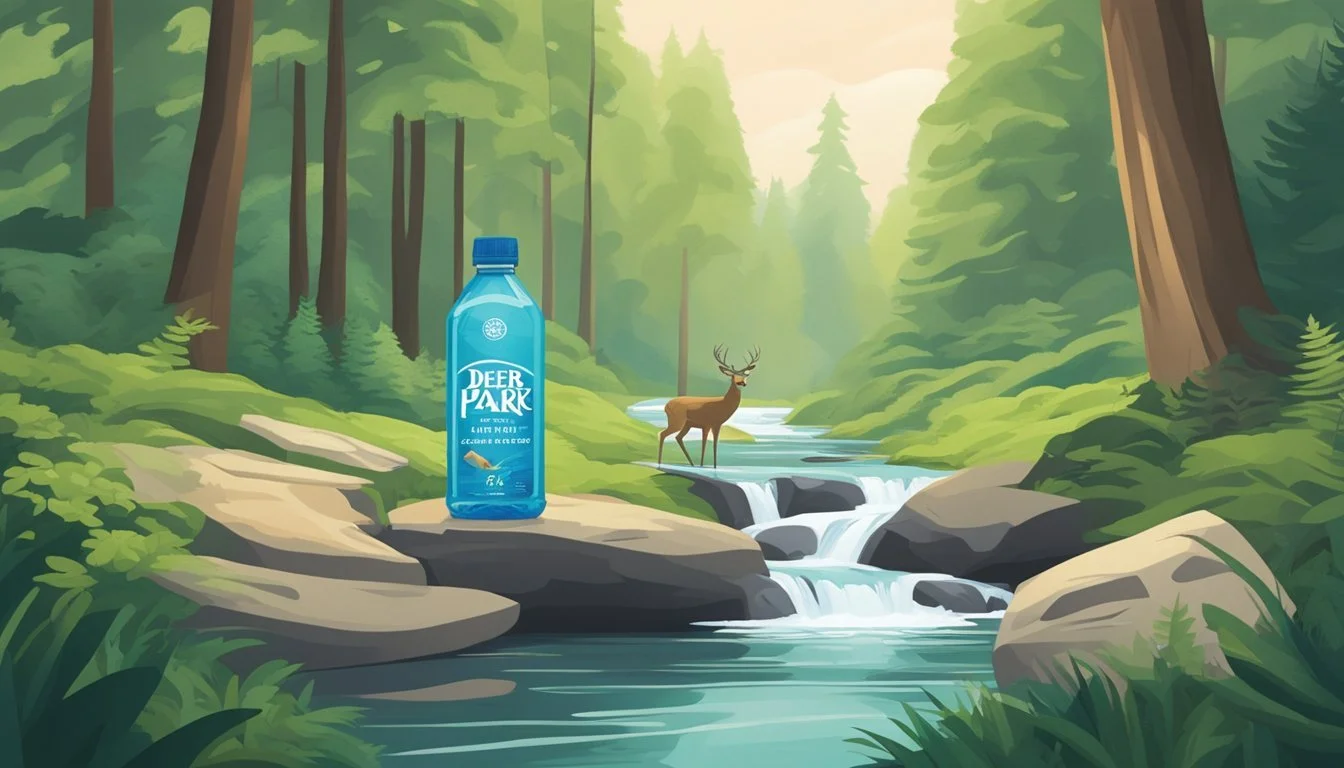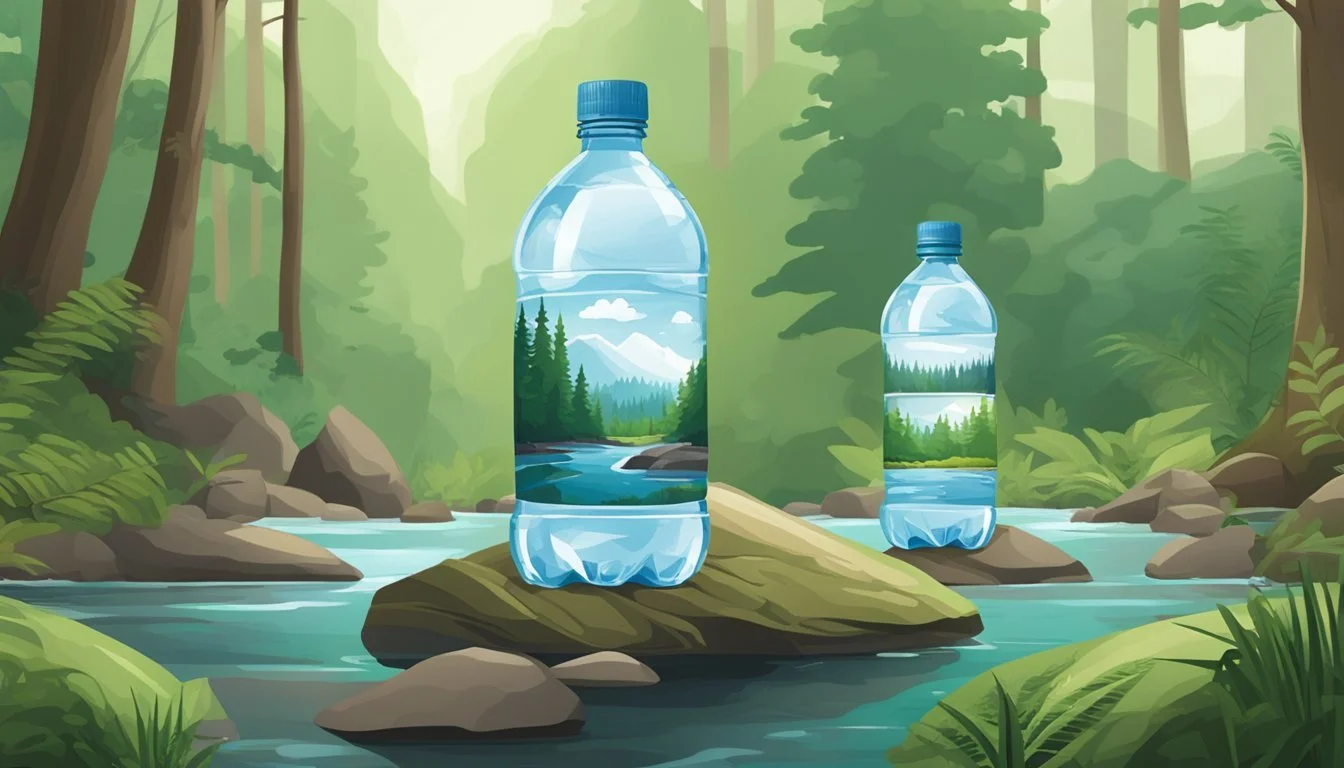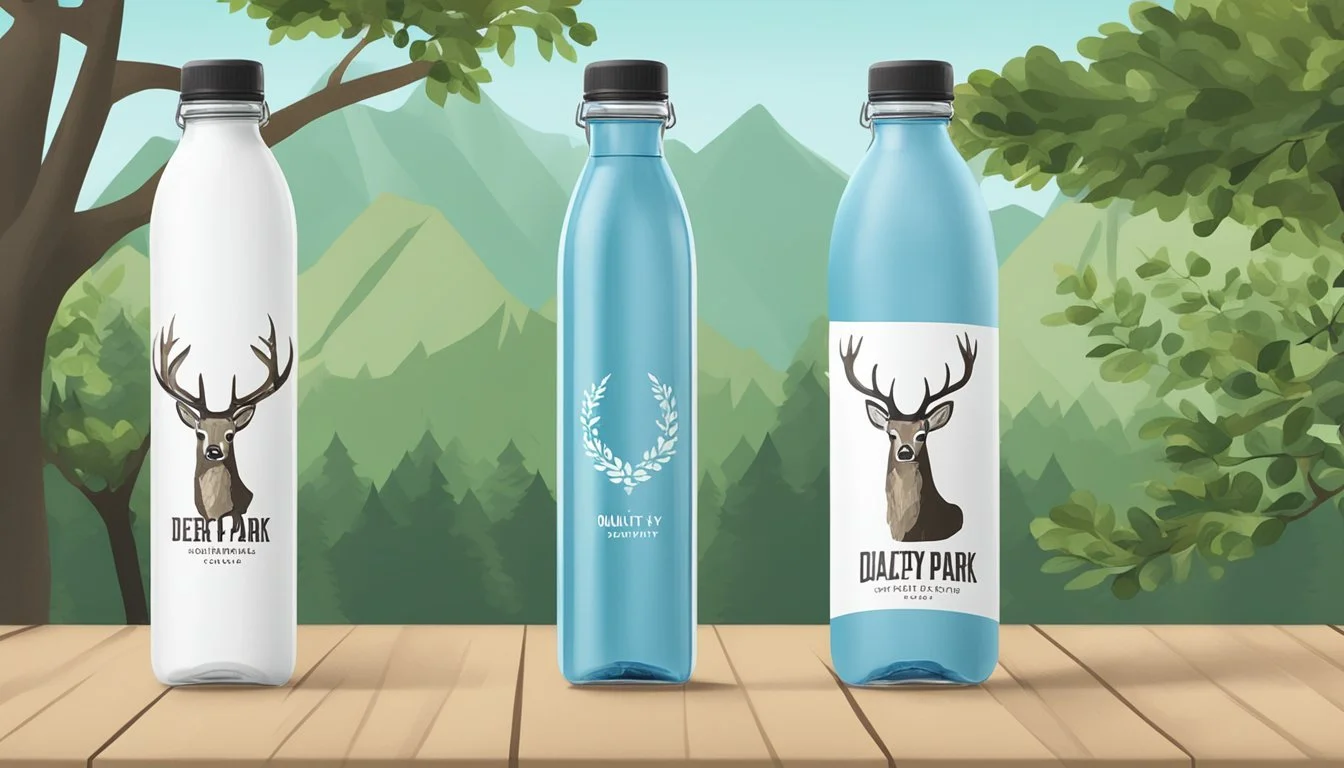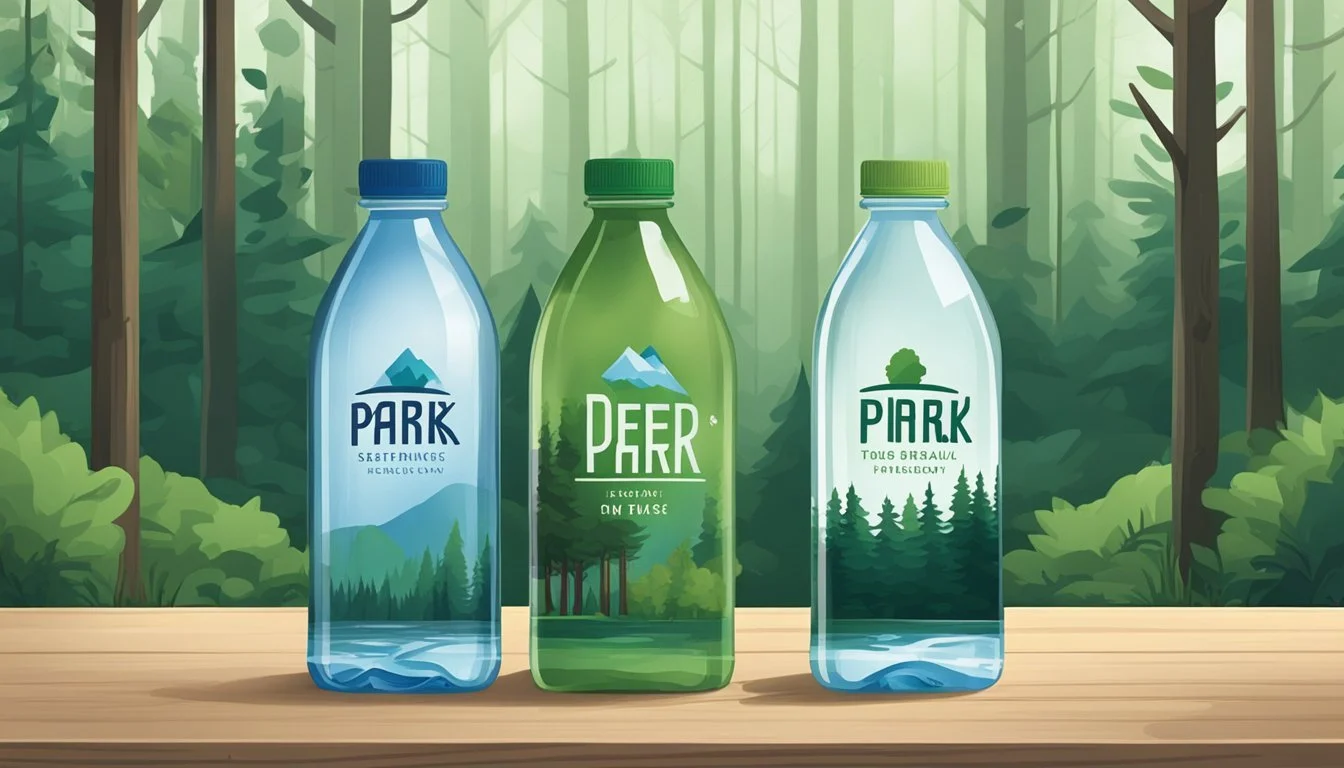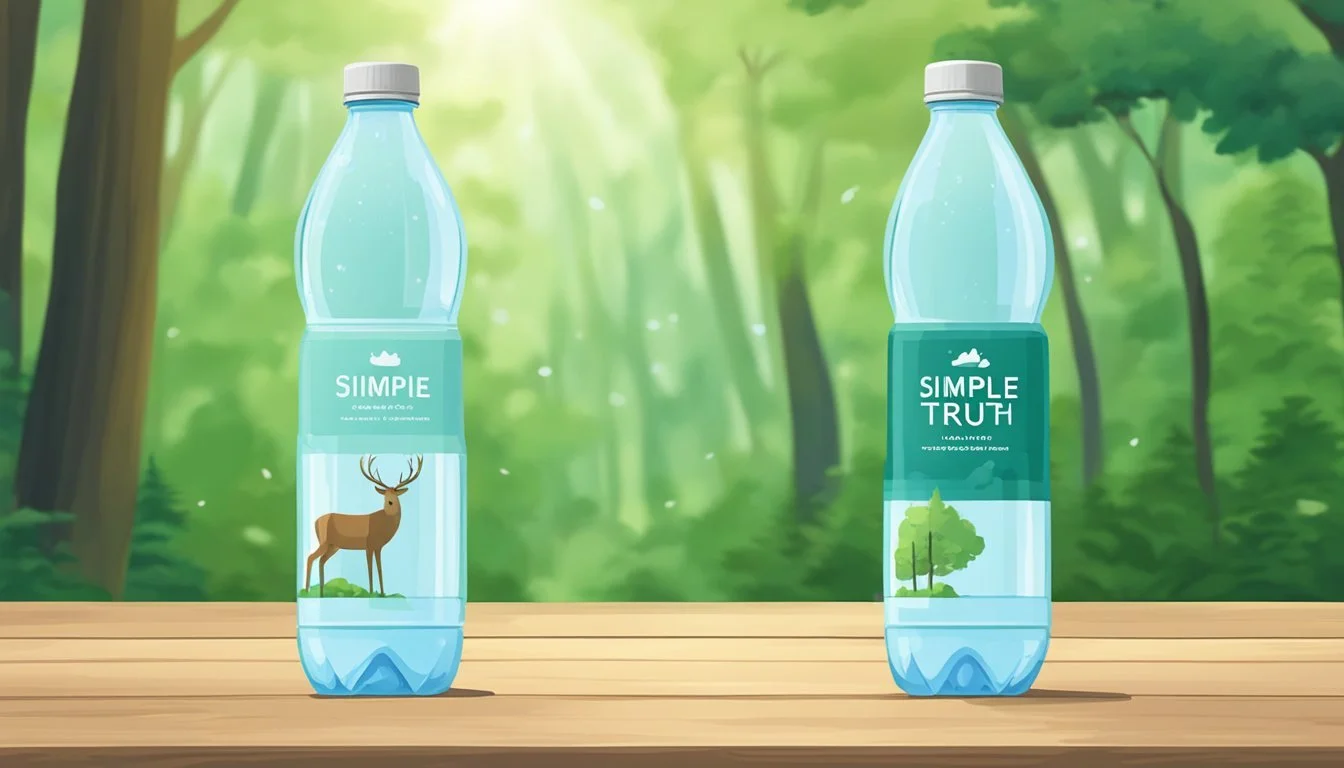Deer Park vs. Simple Truth
Comparing Quality and Taste in Bottled Water
When it comes to choosing the best bottled water, two notable brands often come up in conversation: Deer Park and Simple Truth. Both brands offer unique qualities that appeal to different consumer preferences. Deer Park, a Nestlé brand, sources its water from natural springs across the Eastern Seaboard of the United States, boasting a crisp and clean taste.
On the other hand, Simple Truth, a brand under the Kroger family, emphasizes its commitment to sustainability and eco-friendly packaging. For those concerned about environmental impact, Simple Truth may offer the edge with its focus on reducing plastic waste.
While Deer Park prides itself on its 100% natural spring water, appealing to purists who prioritize natural sources, Simple Truth offers a balance of quality hydration and environmental responsibility. This analysis provides insights that should help readers make an informed decision based on their individual values and preferences.
Understanding Bottled Water
Bottled water comes in various forms, each with unique characteristics depending on its source and treatment process. Understanding these can help consumers make informed choices about their preferred brands and types.
Types of Bottled Water
There are multiple types of bottled water, each defined by its source and the treatment it undergoes:
Spring Water: Sourced from underground formations that flow naturally to the surface. Typically rich in natural minerals.
Mineral Water: Contains a consistent mineral content from the source. Often marketed for its health benefits.
Purified Water: Undergoes processes such as distillation, deionization, or reverse osmosis to remove impurities.
Different types offer varied benefits, from mineral content to taste, often influencing consumer preference.
Source and Origin
The source and origin of bottled water can significantly affect its composition and taste:
Spring Water: Derived from natural springs, often collected at the source.
Mineral Water: Comes from protected underground reservoirs, maintaining a high mineral content.
Purified Water: Originates from any water source but is purified to remove contaminants.
Knowing the source helps in understanding the natural mineral content and potential health benefits associated with the water.
Bottled Water Industry Overview
The bottled water industry is diverse and extensive:
Health and Hydration: Many consumers choose bottled water for its perceived health benefits and convenience.
Sustainability and Environmental Impact: The use of plastic bottles raises concerns about environmental impact. Some brands are moving towards more sustainable packaging.
Market Dynamics: Brands compete based on purity, taste, and mineral content, with a trend towards eco-friendly packaging.
Understanding the industry's dynamics, including health benefits and environmental concerns, can guide better consumer choices and promote a more sustainable approach to bottled water consumption.
Profile: Deer Park and Simple Truth
These two bottled water brands bring unique origin stories and processing methods to the table, affecting the taste, quality, and consumer preference.
Deer Park Water
Deer Park water is marketed as 100% natural spring water, sourced from various springs along the Eastern Seaboard of the United States. Owned by Nestlé, Deer Park has built a reputation for delivering refreshing, crisp-tasting water.
The water undergoes minimal processing to maintain its natural minerals and taste. Quality reports have highlighted the consistent purity of Deer Park, which adheres to stringent standards to ensure safety and cleanliness. Such diligence is reflected in their popularity among consumers who value natural spring sources for hydration.
Simple Truth Water
Simple Truth Water, part of Kroger's organic and natural product line, emphasizes sustainability and purity. Sourced from natural springs, Simple Truth claims to focus on both environmental responsibility and high-quality water production.
Their process often includes carbon filtration and UV light treatment to eliminate impurities while preserving natural minerals. Label transparency is a key feature, offering details about the water source and quality reports on each bottle. These measures are designed to appeal to health-conscious consumers seeking eco-friendly options without compromising on taste or safety.
Quality and Safety Standards
When comparing Deer Park and Simple Truth bottled water, examining their quality and safety standards is critical. This section explores FDA regulations, testing and quality control measures, and environmental standards and certifications for both brands.
FDA Regulations
The Food and Drug Administration (FDA) sets the standards that bottled water must meet in the United States. Both Deer Park and Simple Truth adhere strictly to these regulations. The FDA ensures that both spring water and purified water meet specific microbiological, physical, and chemical standards.
Deer Park sources its water from springs and follows FDA guidelines to maintain purity. Simple Truth, often marketed as a natural and organic brand, also complies with FDA standards. Both brands are required to test for contaminants and maintain strict documentation.
Testing and Quality Control
Both brands implement rigorous testing processes to ensure water quality and safety. Deer Park conducts tests on each batch to check for contaminants, including lead, chlorine, and bacteria. These tests ensure the water remains consistent and safe for consumption.
Simple Truth emphasizes organic and natural standards. Their testing process includes examining pH levels, mineral content, and verifying the absence of harmful substances. Simple Truth often highlights their commitment to transparency, providing details about their testing results to the public.
Environmental Standards and Certifications
Environmental standards are increasingly important to consumers. Deer Park emphasizes its sourcing process, which aims to be sustainable and ecologically friendly. They follow practices to protect natural springs and participate in recycling initiatives to reduce plastic waste.
Simple Truth is known for its organic and eco-friendly branding. They often use packaging made from recycled materials and aim to minimize their environmental footprint. Certifications, such as those from the Rainforest Alliance or similar organizations, endorse their sustainable practices.
In summary, both Deer Park and Simple Truth prioritize quality and safety, adhering to rigorous standards set by authorities, implementing thorough testing procedures, and striving to meet high environmental standards. The choice between the two may depend on personal preferences regarding taste, packaging, and sustainability commitments.
Health and Nutritional Profile
Deer Park and Simple Truth bottled water brands offer different aspects of health benefits and nutritional value. These aspects include the presence of minerals and electrolytes, pH levels, and potential contaminants.
Minerals and Electrolytes
Deer Park is known for its natural spring water, which contains minerals such as calcium, magnesium, and potassium. These minerals contribute to the overall electrolyte balance of the water. Simple Truth also contains essential minerals, often added during the purification process to mimic natural spring water.
The presence of these minerals can greatly impact hydration levels and support bodily functions. Monitoring your daily intake of these minerals can be crucial for maintaining optimal health.
pH Levels in Bottled Water
Deer Park typically features a pH range from 6.3 to 8.7, which is close to neutral and minimally acidic. Simple Truth water often highlights its balanced pH levels, generally around 7.0.
The pH level in water is essential for digestive health and maintaining the body's natural pH balance. While too acidic or alkaline water can potentially affect health, both Deer Park and Simple Truth maintain pH levels within a safe and neutral range.
Contaminants and Chemicals
Consumer safety and contamination are critical when evaluating bottled water. Deer Park prides itself on being free from harmful chemicals like BPA (Bisphenol A) and heavy metals such as lead, arsenic, and mercury.
Simple Truth also addresses concerns around contaminants by ensuring their water is free from PFAS chemicals and other harmful substances. Consuming water with fewer contaminants can reduce health risks, making it safer for regular intake.
Label transparency and independent testing further help verify the safety and purity of these bottled water brands, ensuring that consumers are drinking clean and healthy water.
Water Taste and Palatability
Deer Park and Simple Truth both strive to offer pure, enjoyable drinking experiences. This section addresses three crucial aspects influencing the taste and palatability: taste profile, purification processes, and pH balance.
Taste Profile
Deer Park sources its water from natural springs along the Eastern Seaboard of the United States, which contributes to its reputedly crisp and refreshing taste. The taste is often described as clean and neutral, exhibiting the characteristics of natural spring water.
In contrast, Simple Truth focuses on providing a more consistent taste. It achieves this through purification methods designed to remove various impurities. Consumers may find Simple Truth has a slightly different taste profile, as it aims for a balanced flavor without specific regional characteristics.
Purification Process and Taste
The purification process significantly impacts the taste of bottled water. Deer Park utilizes an integrated multi-step filtration system to ensure its spring water remains pure while preserving natural minerals that contribute to its unique taste.
Simple Truth employs processes such as reverse osmosis, which involves passing water through a membrane to remove contaminants. This can strip certain minerals, potentially leading to a cleaner but less distinct taste compared to Deer Park. Some versions of Simple Truth water also undergo additional steps, like the Hydro-7 filtration, enhancing its purity and leaving a very clean aftertaste.
The Significance of pH Balance
pH levels play a pivotal role in the taste and perceived quality of bottled water. Deer Park typically maintains a pH range between 6.3 and 8.7, closely mimicking the natural pH of spring water, which many consumers find pleasant and crisp.
Simple Truth often aims for a more neutral pH of around 7.0, achieved through its purification processes. Maintaining a neutral pH is vital in ensuring the water does not taste too acidic or alkaline, appealing to a broader audience who prefer balanced flavors.
By understanding these aspects, consumers can better appreciate the differences and make an informed choice based on their taste preferences and desired water quality.
Brand History and Ethics
Examining the origins and corporate ethics of Deer Park and Simple Truth provides insights into their distinct acquisition paths and commitments to global sustainability and community welfare.
Brand Origins and Development
Deer Park traces its origins to Deer Park, Maryland, with its inception shortly after the American Civil War. Initially local, it was later acquired by Nestlé, which expanded its reach across the Eastern Seaboard. Deer Park's spring water has a history rooted in natural sources, which the brand proudly maintains.
Simple Truth, a Kroger-owned label, is much newer and stands out for its commitment to organic and natural products. Launched to address growing consumer demand for transparency, Simple Truth ensures its bottled water meets strict quality controls. This brand prioritizes minimal processing to keep its products as natural as possible.
Corporate Social Responsibility
Deer Park, under Nestlé's wing, emphasizes environmental sustainability through extensive water stewardship programs. These initiatives focus on reducing plastic waste and enhancing water conservation. Nestlé has faced scrutiny from investigative journalists about corporate malfeasance, particularly around resource management. Deer Park aims to mitigate these concerns by bolstering its sustainability practices.
Simple Truth, under Kroger, also embeds strong ethical principles in its operations. The brand promotes eco-friendly packaging and partners with organizations to foster environmental care. Coca-Cola’s Dasani and SmartWater have similar initiatives, but Simple Truth uniquely pledges a portion of its profits to community welfare programs. This approach seeks to uphold both environmental and social responsibility standards.
Consumer Experience
Evaluating the consumer experience involves looking at both packaging convenience and design, as well as customer satisfaction and feedback. These aspects reveal much about user interactions and preferences.
Packaging Convenience and Design
Consumers looking for convenience in their bottled water often prioritize packaging features. Deer Park offers bottles that are BPA-free, ensuring safety and environmental consciousness. Their bottles typically come with easy-to-open caps and ergonomic shapes, which are especially favored by individuals looking for quick hydration options during activities like exercise or travel.
Simple Truth, a brand recognized for its commitment to sustainability, often uses recyclable materials in their packaging. Additionally, their minimalist yet elegant design appeals to environmentally conscious consumers. Simple Truth bottles fit comfortably in hand and are easy to carry, even in tighter spaces like crowded backpacks or car cup holders. Both brands emphasize user-friendly designs but cater to slightly different consumer preferences regarding environmental impact and practical usability.
Customer Satisfaction and Feedback
Customer feedback for Deer Park highlights their reliable taste and natural spring water quality. Many consumers express satisfaction through various platforms, including Twitter, praising its consistent crispness and refreshing nature. Emails to customer service often reflect appreciation for the brand's long history and trusted product.
Simple Truth, known for its eco-friendly approach, garners praise for its efforts towards sustainable packaging. Feedback via email and social media channels like Signal often includes positive remarks on the brand’s ethical values. However, some consumers note that the availability of Simple Truth may be more limited compared to Deer Park, which has a broader distribution network. Despite these variations, both brands achieve high levels of customer satisfaction focusing on their distinct strengths.
Environmental Considerations
Bottled water's environmental impact is a critical factor for eco-conscious consumers. This includes plastic waste generated by disposable bottles and the sustainability practices of brands like Deer Park and Simple Truth.
Bottled Water and Plastic Waste
Plastic bottles contribute significantly to environmental pollution. Each year, millions of tons of plastic waste end up in landfills and oceans, harming wildlife and ecosystems.
BPA, a chemical found in some plastics, poses health risks. Although many bottled water brands, including Deer Park and Simple Truth, claim to use BPA-free bottles, the environmental damage from plastic waste remains an issue.
Consumers can mitigate this by recycling bottles and choosing brands with lower environmental footprints.
Sustainability Practices of Bottled Water Brands
Deer Park emphasizes its commitment to sustainability by sourcing water from multiple natural springs and promoting efficient water management practices.
The brand uses lightweight bottles designed to reduce plastic use and energy consumption during transportation.
Simple Truth, a brand known for its organic and environmentally friendly products, prioritizes the use of recycled materials in its packaging. The brand aims to minimize carbon emissions through local sourcing and eco-friendly manufacturing processes.
Consumer Role in Environmental Impact
Consumers play a pivotal role in reducing the environmental impact of bottled water. Opting for larger, reusable water containers significantly decreases plastic waste compared to single-use bottles.
Supporting brands with strong sustainability practices encourages the market to prioritize environmental considerations. Conscious purchasing choices, such as buying BPA-free and eco-friendly products, make a meaningful difference.
By staying informed and proactive, consumers impact the sustainability efforts of bottled water brands and the overall reduction of plastic waste.
Availability and Choices
Deer Park and Simple Truth bottled waters have distinct differences in their availability and cost, impacting their convenience and value for consumers seeking quality and accessibility.
Retail Availability
Deer Park water enjoys widespread availability, thanks to its distribution through various major retailers like Walmart, Target, and local grocery chains. It is also often seen in vending machines, convenience stores, and office water coolers, enhancing its accessibility.
Simple Truth, a brand associated with Kroger, can predominantly be found in Kroger-owned stores such as Kroger, King Soopers, Fred Meyer, and Ralphs. Whole Foods occasionally stocks Simple Truth products, adding another point of purchase for some consumers. While not as ubiquitous as Deer Park, its distribution within Kroger-owned stores ensures a steady presence in many regions.
Comparing Costs and Value
Deer Park's pricing is competitive, often positioned as an affordable, natural spring water option. Multi-pack options like cases of 24 bottles can often be found on sale, adding to its value proposition for consumers who purchase in bulk. Individual bottles are reasonably priced, making it a budget-friendly choice for many.
Simple Truth, marketed as a premium, organic brand, might come at a slightly higher price point compared to Deer Park. Costs can vary based on location and store promotions. While it may be more expensive, the emphasis on purity and organic sourcing may justify the cost for health-conscious consumers. Promotional deals and loyalty discounts can make Simple Truth a viable option without breaking the bank.
The Bottom Line
Deer Park and Simple Truth are both well-regarded names in the bottled water market, but they have distinct characteristics.
Deer Park offers 100% natural spring water sourced from various springs along the Eastern Seaboard of the United States. Many consumers appreciate its refreshing taste and natural flow. The brand prides itself on minimal additives and high purity levels.
Simple Truth, on the other hand, is known for its purification processes that deliver a clean, crisp taste. It falls under the core hydration category, catering to consumers who prioritize purity and health.
Key Differences:
Type of Water: Deer Park boasts natural spring water, while Simple Truth often uses purified water.
Source: Deer Park sources from multiple springs along the Eastern Seaboard; Simple Truth's sources may vary but often include ultra-purified municipal sources.
Purity and Additives: Deer Park emphasizes its natural spring origins with minimal additives. Simple Truth focuses on advanced purification for a cleaner outcome.
Consumer Preferences:
Deer Park is favored for its natural and refreshing profile.
Simple Truth appeals to those who value sophisticated purification methods and consistency.
Comparison Table:
Aspect Deer Park Simple Truth Type of Water Natural spring water Purified water Source Springs along the Eastern Seaboard Varies; often municipal sources Purity High; minimal processing Ultra-purified Taste Refreshing, natural Crisp, clean Additives Minimal Focus on purity, often no additives
Deer Park is comparable to other natural spring waters like Mountain Valley and Acqua Panna. Meanwhile, Simple Truth finds its place among purified waters, similar to Aquafina and Pure Life.
Readers should consider their personal priorities when choosing between these two brands. Whether one prefers natural spring sources or ultra-purified municipal origins, both Deer Park and Simple Truth offer reputable options in the bottled water market.
More About Deer Park
Deer Park vs Cascade Mountain: Which Bottled Water is Better?
Deer Park vs Hawaii Volcanic: Which Bottled Water is Better?
Deer Park vs Hawaiian Springs: Which Bottled Water is Better?
Deer Park vs Icelandic Glacial: Which Bottled Water is Better?
Deer Park vs Kirkland Signature: Which Bottled Water is Better?
Deer Park vs Mountain Valley Spring Water: Which Bottled Water is Better?
Deer Park vs Nestle Pure Life: Which Bottled Water is Better?
Deer Park vs Richard's Rainwater: Which Bottled Water is Better?
Deer Park vs Solan de Cabras: Which Bottled Water is Better?
Deer Park vs Talking Rain AQA: Which Bottled Water is Better?
Deer Park vs Whole Foods 365: Which Bottled Water is Better?
Deer Park vs Whole Foods Italian Still Mineral water: Which Bottled Water is Better?
More About Simple Truth
Aqua Carpatica vs Simple Truth: Which Bottled Water is Better?
Cascade Mountain vs Simple Truth: Which Bottled Water is Better?
Core Hydration vs Simple Truth: Which Bottled Water is Better?
Crystal Geyser vs Simple Truth: Which Bottled Water is Better?
Hawaii Volcanic vs Simple Truth: Which Bottled Water is Better?
Hawaiian Springs vs Simple Truth: Which Bottled Water is Better?
Ice Mountain vs Simple Truth: Which Bottled Water is Better?
Icelandic Glacial vs Simple Truth: Which Bottled Water is Better?
Liquid Death vs Simple Truth: Which Bottled Water is Better?
Mountain Valley Spring Water vs Simple Truth: Which Bottled Water is Better?
Nestle Pure Life vs Simple Truth: Which Bottled Water is Better?
Poland Spring vs Simple Truth: Which Bottled Water is Better?
Purely Sedona vs Simple Truth: Which Bottled Water is Better?
Richard's Rainwater vs Simple Truth: Which Bottled Water is Better?
San Pellegrino vs Simple Truth: Which Bottled Water is Better?
Simple Truth vs Crystal Lake: Which Bottled Water is Better?
Simple Truth vs Essence pH10: Which Bottled Water is Better?
Simple Truth vs Kirkland Signature: Which Bottled Water is Better?
Simple Truth vs Proud Source: Which Bottled Water is Better?
Simple Truth vs Talking Rain AQA: Which Bottled Water is Better?
Simple Truth vs Whole Foods 365: Which Bottled Water is Better?
Solan de Cabras vs Simple Truth: Which Bottled Water is Better?
Whole Foods Italian Still Mineral water vs Simple Truth: Which Bottled Water is Better?

